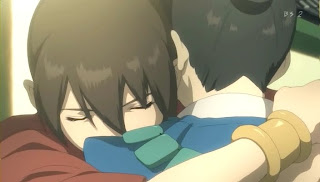"Hollywood Ending." n. Def. a typical improbable or simplistically positive movie ending; also, an outcome to an event that would be a more likely film ending than real-life result.
One thing I've grown to love in many of the anime features, series and OVAs is their success in avoiding typical "Hollywood endings." Yes, yes - these productions aren't from Hollywood so maybe it is not surprising that their endings do not habitually resemble the endings of American productions. Still, there are plenty of shows and movies from around the world (Japan included) which cleave to happy endings, with all strings tied and all conflicts resolved.
Don't get me wrong, I often want that type of an ending. I do not always want to have my thoughts endlessly provoked, my stomach tied in knots wondering what happened to the characters I came to care about. Sometimes the pat ending is exactly what I'm looking for. The ending where each characters' long term fate is clearly laid out, where villains get their comeuppance and heroes get their just desserts.
But sometimes that Hollywood ending - or, perhaps more fittingly (since we are talking about an animated medium), that Disney ending - must be eschewed. More complex, real-world endings often are necessary to fully tell a story, or to honor the source material, or to respect your audience. Those layered and ambiguous endings can be more satisfying, allowing multiple interpretations and leaving open the option of further tales involving the same characters. Such endings don't diminish or oversimplify complicated characters and plot lines, don't belittle the intellect of the viewer, and invite further viewings and discussions about the show or film.
These contemplations on how a show or film chooses to conclude came to mind because I finally (finally) finished the show Moribito: Guardian of the Spirit. I mentioned it in an earlier column about shows that I could not bring myself to finish (mostly because I loved them so much that the thought of watching the last episode was almost unbearable); let's just say that before tonight, the last episode I had watched of this fantastic show was during 2009. The ending was, unsurprisingly, beautifully done - while it did not end with a cliffhanger or complete uncertainty, it likewise did not answer every question or give a viewer the most positive and emotionally satisfying conclusion. The major conflict of the show was resolved, but the human aftermath, the way the characters went on with their lives afterward, was only sketched out and not specifically shown. There were farewells that were not clearly final, one could hope and imagine that some characters would meet again. There were hints that perhaps some characters would finally connect, but no promise that this would happen. I was left satisfied, because the ending was as gracefully and intelligently done as the rest of the series, but was also left wondering (and more than a little bit misty eyed).
There are so many anime shows and films that shunned the concept of a Hollywood ending. Some are so dark that the ending could not even begin to be described as a happy one: such as Gunslinger Girl (a disturbing tale of orphaned or all-but-terminally ill young girls who are brainwashed and physically altered to act as assassins) and Jin-Roh: The Wolf Brigade (a modern, loose and twisted tale which alludes to, directly and indirectly, that dark tale of Little Red Riding Hood).
Other shows and films utilize ambiguity, so that the viewer can imagine the ending as happy or sad - films like Sword of the Stranger or series like Samurai Champloo. Still others have intricate story lines and characters with various and realistic motivations; such shows (like Moribito) tie up the major conflict of the series, but leave open other plot points - shows that include Witch Hunter Robin and Welcome to the NHK.
Endings might be impossible to really explain without ruining the point of the entire series (like Paranoia Agent or Paprika); others are more about the journey of the characters than their actual destination (take Kino's Journey); some endings do tie up many details, but cannot be purely happy without making the story trite and/or unrealistic (BECK: Mongolian Chop Squad and Samurai 7).
But perhaps the best example of a non-Hollywood ending - an ending that could be happy or sad, that leaves you guessing and infuriated and satisfied and unsatisfied, curious and frustrated, excited and impressed - is the end to Cowboy Bebop. I often wax rhapsodic about Bebop, and a big reason for this is because, to this day, I still wonder what happened to Spike. I wonder if Faye ever found her way. I wonder what Edward is up to and how Jet Black is holding up. And I have to continue to accept the fact that I will almost certainly never have the answer to any of these questions.
Even more importantly, I have to pray that when Hollywood does its live action adaptation of the venerable and nearly perfect show, it doesn't append the dreaded and eponymous ending, that "Hollywood" ending, which it is so wont to propagate. The idea of sullying such a show with a simplistic and cheerful ending is nothing if not horrifying. So let's hope that, as viewers, some questions are never answered, some conflicts are never resolved, and some endings, explanations and events are never fully elucidated.
See you, space cowboy.
Sunday, August 1, 2010
Subscribe to:
Comments (Atom)




